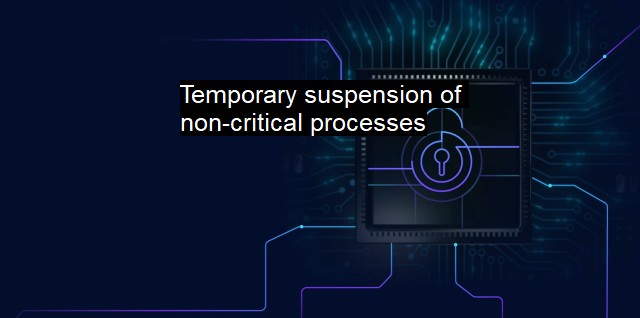What are Temporary suspension of non-critical processes?
The Importance of Temporary Suspension of Non-Critical Processes in Cybersecurity: Enhancing Antivirus Security to Protect Against Malware Threats
The term "temporary suspension of non-critical processes" is a procedure often carried out to enhance computing power, streamline operations, or isolate potential problematic components. It essentially refers to the act of temporarily halting certain processes that are not immediately necessary for the primary function of a system. Implementing this strategy allows IT experts to prioritize resources needed for critical tasks, promptly respond to threats, and consequently improve the overall cybersecurity.Non-critical processes could include add-ons, third-party apps, scripts, caching activities, or background services that are not involved in primary, real-time transactions or operations, but they still consume system resources. These are not immediately necessary for maintaining basic functionality, optimum response, or security of the system. Therefore, whenever needed, relevant authorities elect to momentarily suspend these processes.
This strategy is often implemented during an ongoing attack or threat.
Temporary suspension of non-critical processes is crucial in times of a cyber attack because it frees up computing resources to deal with the imminent threat

Temporary suspension of non-critical processes FAQs
What is the temporary suspension of non-critical processes in the context of cybersecurity and antivirus?
The temporary suspension of non-critical processes refers to the practice of suspending all unnecessary or low-priority processes in a system to focus on more critical operations such as cybersecurity and antivirus scans. This strategy is employed to minimize the risk of malware attacks and other security threats.Why is it necessary to temporarily suspend non-critical processes during cybersecurity measures?
Suspending non-critical processes during cybersecurity measures is necessary as it helps to free up system resources that may be needed to perform critical operations such as antivirus scans. Running these processes can cause a strain on the system, leading to slow or interrupted scans, which can leave the system vulnerable to attacks.What are examples of non-critical processes that can be temporarily suspended during cybersecurity measures?
Examples of non-critical processes that can be suspended during cybersecurity measures include automated updates, background processes, and non-essential applications. These processes are not essential for the system's functioning, and suspending them can help to optimize system resources and ensure more effective scans.How long does the temporary suspension of non-critical processes last during cybersecurity measures?
The length of time for the temporary suspension of non-critical processes during cybersecurity measures may vary depending on the specific needs of the system. However, it is generally recommended that these processes be suspended until the critical operations such as antivirus scans are completed. After that, the processes can be resumed.| | A | | | B | | | C | | | D | | | E | | | F | | | G | | | H | | | I | | | J | | | K | | | L | | | M | |
| | N | | | O | | | P | | | Q | | | R | | | S | | | T | | | U | | | V | | | W | | | X | | | Y | | | Z | |
| | 1 | | | 2 | | | 3 | | | 4 | | | 7 | | | 8 | | |||||||